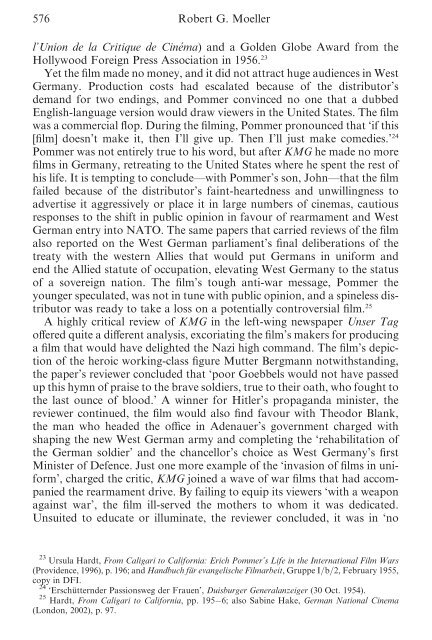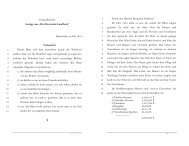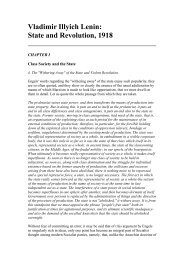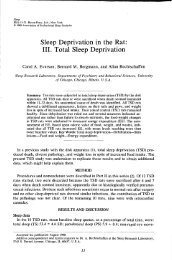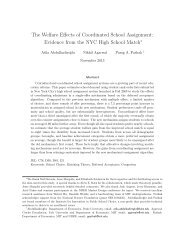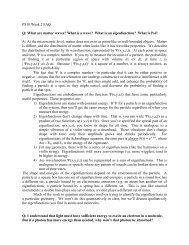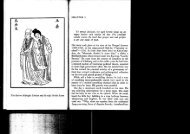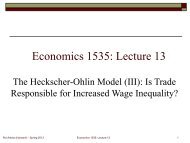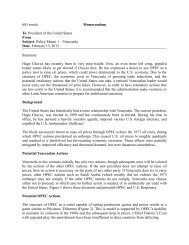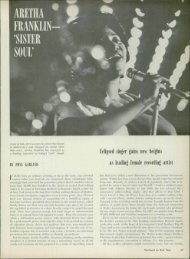What Did You Do in the War, Mutti? Courageous Women ... - iSites
What Did You Do in the War, Mutti? Courageous Women ... - iSites
What Did You Do in the War, Mutti? Courageous Women ... - iSites
Create successful ePaper yourself
Turn your PDF publications into a flip-book with our unique Google optimized e-Paper software.
576 Robert G. Moeller<br />
l’Union de la Critique de C<strong>in</strong>éma) and a Golden Globe Award from <strong>the</strong><br />
Hollywood Foreign Press Association <strong>in</strong> 1956. 23<br />
Yet <strong>the</strong> film made no money, and it did not attract huge audiences <strong>in</strong> West<br />
Germany. Production costs had escalated because of <strong>the</strong> distributor’s<br />
demand for two end<strong>in</strong>gs, and Pommer conv<strong>in</strong>ced no one that a dubbed<br />
English-language version would draw viewers <strong>in</strong> <strong>the</strong> United States. The film<br />
was a commercial flop. Dur<strong>in</strong>g <strong>the</strong> film<strong>in</strong>g, Pommer pronounced that ‘if this<br />
[film] doesn’t make it, <strong>the</strong>n I’ll give up. Then I’ll just make comedies.’ 24<br />
Pommer was not entirely true to his word, but after KMG he made no more<br />
films <strong>in</strong> Germany, retreat<strong>in</strong>g to <strong>the</strong> United States where he spent <strong>the</strong> rest of<br />
his life. It is tempt<strong>in</strong>g to conclude—with Pommer’s son, John—that <strong>the</strong> film<br />
failed because of <strong>the</strong> distributor’s fa<strong>in</strong>t-heartedness and unwill<strong>in</strong>gness to<br />
advertise it aggressively or place it <strong>in</strong> large numbers of c<strong>in</strong>emas, cautious<br />
responses to <strong>the</strong> shift <strong>in</strong> public op<strong>in</strong>ion <strong>in</strong> favour of rearmament and West<br />
German entry <strong>in</strong>to NATO. The same papers that carried reviews of <strong>the</strong> film<br />
also reported on <strong>the</strong> West German parliament’s f<strong>in</strong>al deliberations of <strong>the</strong><br />
treaty with <strong>the</strong> western Allies that would put Germans <strong>in</strong> uniform and<br />
end <strong>the</strong> Allied statute of occupation, elevat<strong>in</strong>g West Germany to <strong>the</strong> status<br />
of a sovereign nation. The film’s tough anti-war message, Pommer <strong>the</strong><br />
younger speculated, was not <strong>in</strong> tune with public op<strong>in</strong>ion, and a sp<strong>in</strong>eless distributor<br />
was ready to take a loss on a potentially controversial film. 25<br />
A highly critical review of KMG <strong>in</strong> <strong>the</strong> left-w<strong>in</strong>g newspaper Unser Tag<br />
offered quite a different analysis, excoriat<strong>in</strong>g <strong>the</strong> film’s makers for produc<strong>in</strong>g<br />
a film that would have delighted <strong>the</strong> Nazi high command. The film’s depiction<br />
of <strong>the</strong> heroic work<strong>in</strong>g-class figure Mutter Bergmann notwithstand<strong>in</strong>g,<br />
<strong>the</strong> paper’s reviewer concluded that ‘poor Goebbels would not have passed<br />
up this hymn of praise to <strong>the</strong> brave soldiers, true to <strong>the</strong>ir oath, who fought to<br />
<strong>the</strong> last ounce of blood.’ A w<strong>in</strong>ner for Hitler’s propaganda m<strong>in</strong>ister, <strong>the</strong><br />
reviewer cont<strong>in</strong>ued, <strong>the</strong> film would also f<strong>in</strong>d favour with Theodor Blank,<br />
<strong>the</strong> man who headed <strong>the</strong> office <strong>in</strong> Adenauer’s government charged with<br />
shap<strong>in</strong>g <strong>the</strong> new West German army and complet<strong>in</strong>g <strong>the</strong> ‘rehabilitation of<br />
<strong>the</strong> German soldier’ and <strong>the</strong> chancellor’s choice as West Germany’s first<br />
M<strong>in</strong>ister of Defence. Just one more example of <strong>the</strong> ‘<strong>in</strong>vasion of films <strong>in</strong> uniform’,<br />
charged <strong>the</strong> critic, KMG jo<strong>in</strong>ed a wave of war films that had accompanied<br />
<strong>the</strong> rearmament drive. By fail<strong>in</strong>g to equip its viewers ‘with a weapon<br />
aga<strong>in</strong>st war’, <strong>the</strong> film ill-served <strong>the</strong> mo<strong>the</strong>rs to whom it was dedicated.<br />
Unsuited to educate or illum<strong>in</strong>ate, <strong>the</strong> reviewer concluded, it was <strong>in</strong> ‘no<br />
23<br />
Ursula Hardt, From Caligari to California: Erich Pommer’s Life <strong>in</strong> <strong>the</strong> International Film <strong>War</strong>s<br />
(Providence, 1996), p. 196; and Handbuch für evangelische Filmarbeit, Gruppe I=b=2, February 1955,<br />
copy <strong>in</strong> DFI.<br />
24<br />
‘Erschütternder Passionsweg der Frauen’, Duisburger Generalanzeiger (30 Oct. 1954).<br />
25<br />
Hardt, From Caligari to California, pp. 195 6; also Sab<strong>in</strong>e Hake, German National C<strong>in</strong>ema<br />
(London, 2002), p. 97.


